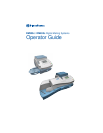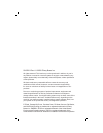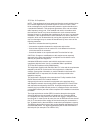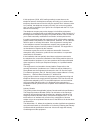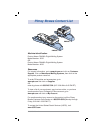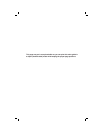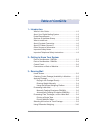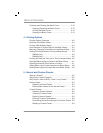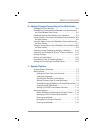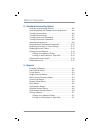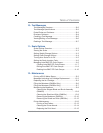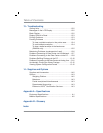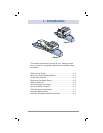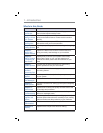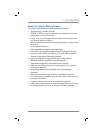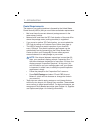FCC Part 15 Compliance
NOTE: This equipment has been tested and found to comply with the limits
for a Class B digital device, pursuant to part 15 of the FCC rules. These
limits are designed to provide reasonable protection against interference in
a residential installation. This equipment generates, uses, and can radiate
radio frequency energy and, if not installed and used in accordance with
the instruction manual, may cause interference to radio communications.
However, there is no guarantee that interference will not occur in a particular
installation. If this equipment does cause interference to radio or television
reception, which can be determined by turning the equipment off and on, the
user is encouraged to try to correct the interference by one or more of the
following measures:
• Reorient or relocate the receiving antenna.
• Increase the separation between the equipment and receiver.
• Connect the equipment into an outlet on a circuit different from that to
which the receiver is connected.
• Consult the dealer or an experienced radio/TV technician for help.
CAUTION: Changes or modifi cations to this equipment not expressly
approved by the party responsible for compliance could void the user’s
authority to operate the equipment.
A shielded USB cable must be used with this equipment to ensure
compliance with the limits. Use of a unshielded cable is prohibited.
FCC Part 68 Compliance of the G900 Modem
This equipment complies with Part 68 of the FCC rules and the requirements
adopted by the ACTA. On the back of this equipment is a label that
contains, among other information, a product identifi er in the format US:
AAAEQ##TXXXX. If requested, this number must be provided to the
telephone company.
This equipment is designed to be connected to a Facility Interface Code
02LS2 network with RJ11C network interface.
A plug and jack used to connect this equipment to the premises wiring
and telephone network must comply with the applicable FCC Part 68 rules
and requirements adopted by the ACTA. A compliant telephone cord and
modular plug is provided with this product. It is designed to be connected to
a compatible modular jack that is also compliant. See installation instructions
for details.
The ringer equivalence number (REN) is used to determine the number
of devices that may be connected to a telephone line. Excessive RENs
on a telephone line may result in the devices not ringing in response to an
incoming call. In most but not all areas, the sum of RENs should not exceed
fi ve (5). To be certain of the number of devices that may be connected to a
line, as determined by the total RENs, contact the local telephone company.
The REN for this product is part of the product identifi er that has the format
US:AAAEQ##TXXXX. The digits represented by ## are the REN without a
decimal point (for example 03 is a REN of 0.3).



